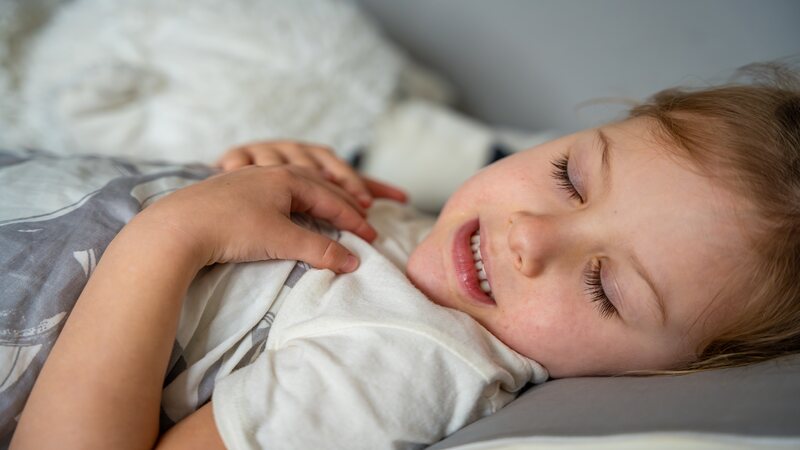
New mothers are in for lots of new experiences with their babies. Some are normal while others may not be. If you notice your little one constantly moving his/her mouth while sleeping and there movements are accompanied by sounds, it is possible that your toddler is grinding his teeth, a practice that is quite common and referred to as Bruxism in the dental jargon. Approximately 2-3 out of every 10 children are known to grind their teeth while sleeping and this is definitely not a cause for alarm. To know more about this continue reading.
Why Do Children Grind Their Teeth In Sleep?
While experts are not able to pin point the exact reason, they mention that it could be because of one or more of the following causes:
- When the teething phase begins, toddlers often feel uncomfortable and this makes them grind their teeth often
- The top and the bottom teeth may not be aligned properly
- Grinding may help relieve pain in the ear or ease the discomfort that teething brings about
- In extreme cases, it could be because of a serious medical condition such as cerebral palsy or could be a response to medications taken
- Tension/ anxiety could trigger the grinding
- Stuffy nose or allergies and in some cases worms could also be responsible
- Children may be worried about a change in their immediate surroundings. For instance, a new teacher at school or the arrival of a new sibling at home
- Sometimes, it may be as simple a reason as a sore muscle that is causing pain
- In some instances, stress could also be a reason. For instance, a test at school, an argument with parents or siblings creates enough stress in the little minds to cause grinding of the teeth
- Even hyperactivity is known to be a cause for bruxism
As already mentioned, teeth grinding is not uncommon among children and usually stops by the time they get their permanent teeth that is by the time they turn 6. Almost all the grinding happens at night, though there are a few who do it during the day too.
What Happens When Children Grind Their Teeth?
In most of the cases, bruxism does not have serious side effects. In some cases, it could cause the enamel to be eroded or the tooth to be chipped. It can sometimes cause headaches and earaches in some children. Moreover, constant grinding can also cause pain in the face and jaws. Most children outgrow the habit before any serious damage is done.

Diagnosing Teeth Grinding or Bruxism In Children
In case you wish, you could consult a dentist to check for wear, cavities or fractures, or if your child complains of pain in the face/jaw every morning or finds it difficult to chew food. The dentist will spray air and water on the teeth to check for any unusual sensitivity.
If the dentist finds some damage in your child’s teeth he may ask few questions to your child like:
- How does he feel before bedtime?
- Is something bothering him?
- Is he angry with someone?
- What does he do before bedtime?
This exam will help the dentist diagnose reason for teeth grinding. He will ascertain whether the cause is misaligned teeth or is it psychological i.e. due to some kind of stress. After analyzing the reason for teeth grinding he will come up with a treatment plan that is appropriate as well as effective for your child.
Is It Possible To Stop The Child From Teeth Grinding?
As already mentioned, bruxism is not a cause for worry, but the sound of teeth clenching night after night may not be a pleasant one. So, how can it be controlled?
- Unless the child is about 5 years or older and has started getting permanent teeth, doctors don’t prescribe the night guard fitted to the gums to prevent clenching
- For toddlers, you may try to work on a soothing bedtime routine—a soak in the tub, a little massage, cuddling and rocking to put the child to sleep. Most mothers have found that this helps soothe pain and anxiety
- If there is a problem with the alignment of the teeth you may have to visit the dentist to check out on the solution for that
- Make sure your child’s drinks plenty of water. Dehydration can also cause teeth grinding in children
- For minor aches and pains or an ear infection, you can consult your doctor for a mild painkiller to allow your baby to get a good night’s sleep
Mothers with toddlers often encounter experiences and situations that they have never dealt with earlier which become a cause for worry. Sometimes, neighbors and friends can add to the worry by giving wrong information. When you find yourself in a situation and are not sure on how to handle it, it is best to consult a pediatrician and get some expert advice. Bruxism, in most of the cases is a minor problem that need not make you press the panic button. But if the grinding continues regularly even after your kid is 6 years or more, you might want to take it seriously. Some experts even say that children who drool a lot and talk in their sleep are known to clench their teeth. Some say that it could be genetic. So, put your worries to rest and think of ways to pamper your child to make him/her sleep tight and drift off to dreamland. That way clenching might not pop in to worry you.

